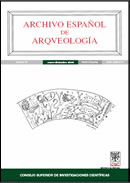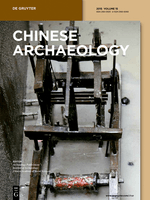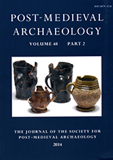
Azania-Archaeological Research in Africa
Scope & Guideline
Advancing Knowledge in African Archaeology.
Introduction
Aims and Scopes
- Archaeological Methodologies:
The journal emphasizes the use of various archaeological methodologies, including excavation, survey, analysis of material culture, and experimental archaeology, to understand the complexities of Africa's past. - Cultural and Historical Contexts:
Research published in Azania often contextualizes archaeological findings within broader cultural and historical frameworks, providing insights into social dynamics, trade networks, and interactions among different groups. - Regional Focus:
The journal covers a wide geographic area, including sub-Saharan Africa, North Africa, and the Indian Ocean region, allowing for comparative studies and regional syntheses that highlight the continent's diversity. - Interdisciplinary Approaches:
Azania encourages interdisciplinary research that integrates archaeology with other fields such as anthropology, history, and environmental science, fostering a holistic understanding of past societies. - Specialized Studies:
The journal features specialized studies on specific archaeological sites, artifacts, and themes, contributing to the detailed knowledge of Africa's archaeological record.
Trending and Emerging
- Environmental Archaeology:
There is an increasing focus on environmental archaeology, particularly studies that explore the interactions between humans and their environments, such as climate change impacts on ancient societies. - Cultural Heritage and Identity:
Research related to cultural heritage and identity has gained prominence, highlighting how archaeological findings inform contemporary understandings of identity, belonging, and cultural continuity. - Technological Advances in Archaeology:
The use of advanced technologies, such as remote sensing, GIS, and bioarchaeological techniques, is on the rise, allowing for more nuanced analyses of archaeological data. - Interdisciplinary Collaboration:
There is a growing trend towards interdisciplinary collaboration, with archaeologists increasingly engaging with historians, anthropologists, and environmental scientists to enrich their research. - Community Engagement and Public Archaeology:
Emerging themes in community engagement and public archaeology emphasize the importance of involving local communities in archaeological research and heritage management, fostering a sense of ownership and responsibility.
Declining or Waning
- Traditional Stone Age Studies:
There has been a noticeable decline in the number of papers focused solely on traditional Stone Age studies, as researchers increasingly shift towards more complex social dynamics and cultural interactions. - Local vs. Global Narratives:
The emphasis on local narratives and site-specific studies has decreased in favor of broader, more comparative studies that seek to understand regional and global interactions, potentially sidelining local archaeological contexts. - Historical Archaeology:
While historical archaeology remains important, there appears to be a waning focus on colonial and post-colonial studies, as researchers pivot towards earlier periods and indigenous histories.
Similar Journals

Britannia
Illuminating Cultural Heritage with Rigorous ResearchBrittannia is a prestigious journal published by Cambridge University Press that serves as a cornerstone for scholars and enthusiasts in the fields of Archaeology, Classics, and History. With its ISSN of 0068-113X and E-ISSN of 1753-5352, the journal has been committed to disseminating high-quality research and innovative studies since its inception in 1970, addressing vital topics that span cultural, historical, and archaeological dimensions. As a hallmark of academic rigor, it maintains a Q1 ranking in Classics and History and a Q2 ranking in Archaeology (both Arts and Humanities, 2023), reflecting its impact and significance in these disciplines. Although not an Open Access journal, it provides invaluable content for researchers, professionals, and students alike, ensuring that vital insights into ancient civilizations and cultural heritage resonate well beyond the pages of each issue. With upcoming publications scheduled through 2024, Brittannia continues to be an essential resource for anyone invested in the legacies of the past.

Archivo Espanol de Arqueologia
Advancing archaeological knowledge through open access.Archivo Español de Arqueología is a prestigious journal published by the Consejo Superior de Investigaciones Científicas (CSIC), dedicated to the field of archaeology and the historical sciences. Since its transition to Open Access in 1991, this journal has been a significant resource for scholars and practitioners in Spain and beyond, ensuring the dissemination of high-quality research to a broad audience. With an impressive Scopus ranking that places it within the top 20% of journals in the disciplines of History and Archaeology, Archivo Español de Arqueología plays a crucial role in advancing academic discourse and promoting innovative archaeological methodologies. The journal has maintained rigorous standards, reflected in its placement within the Q2 and Q3 quartiles, enabling it to establish a reputation for excellence and reliability in archaeological scholarship. Researchers, professionals, and students are encouraged to explore the journal's diverse array of articles from its foundation year of 2009 to the present, enriching their understanding of the past through the latest findings and theoretical advancements in archaeology.

Archeologicke Rozhledy
Fostering interdisciplinary dialogue in the heart of Prague.Archeologicke Rozhledy, published by the Academy of Sciences of the Czech Republic, Institute of Archaeology, is a pivotal open-access journal dedicated to advancing the field of archaeology. Since transitioning to open access in 2019, it has made significant strides in disseminating high-quality research, serving as a vital resource for researchers, professionals, and students alike. With an ISSN of 0323-1267, the journal has gained recognition for its contributions in the domains of arts and humanities, particularly archaeology, as evidenced by its 2023 Q2 ranking in both categories. Operating out of the historical city of Prague, the journal encompasses a broad scope of archaeological scholarship, reflecting a commitment to interdisciplinary approaches and fostering dialogue within the global archaeological community. With its notable Scopus rankings—#115/413 in Arts and Humanities and #113/354 in Social Sciences—Archeologicke Rozhledy stands as a crucial outlet for innovative research and scholarly exchange.

Chinese Archaeology
Uncovering the Depths of China's PastChinese Archaeology, published by WALTER DE GRUYTER GMBH, is a leading journal dedicated to the exploration and study of China's rich archaeological heritage. With an ISSN of 2160-5025 and an E-ISSN of 2160-5068, this journal serves as an essential platform for scholars, researchers, and enthusiasts in the field of archaeology, offering a blend of original research articles, reviews, and critical essays that address both contemporary issues and historical narratives. While it currently operates under a conventional access model, making cutting-edge research available to a select audience, it plays a crucial role in advancing knowledge about China's archaeological sites, artifacts, and past civilizations. Given the increasing interest in Eastern archaeology and its significance in a global context, Chinese Archaeology is positioned as a pivotal resource for understanding and interpreting the complexities of China’s historical evolution. Researchers and academics are encouraged to contribute and engage with this vital field of study to foster greater insights and innovations.

Conimbriga-Revista de Arqueologia
Unlocking the Secrets of the Past, One Article at a TimeConimbriga-Revista de Arqueologia is a distinguished open-access journal dedicated to the field of archaeology, published by COIMBRA UNIVERSITY PRESS. Since its inception, the journal has fostered a vibrant intellectual community focused on the exploration and dissemination of archaeological research, particularly emphasizing studies relevant to the rich historical and cultural heritage of Portugal and beyond. With its open access model established in 2014, it has become a vital resource for researchers, professionals, and students to share their findings without access barriers, encouraging collaboration and knowledge exchange. Despite the absence of specific metrics such as the HIndex and Scopus rankings, the journal is recognized for its commitment to high-quality scholarship and its role in advancing archaeological discourse. Positioned within the scholarly landscape, Conimbriga-Revista de Arqueologia serves as a crucial platform for the publication of innovative research, reviews, and critical essays, making it an essential journal for those invested in the archaeological sciences.

Post-Medieval Archaeology
Connecting Artifacts to Historical NarrativesPost-Medieval Archaeology is a distinguished academic journal published by ROUTLEDGE JOURNALS, TAYLOR & FRANCIS LTD, focusing on the rich tapestry of human history from the post-medieval period through the lens of archaeology. With a proud publication history spanning since 1967, this journal addresses the integration of archaeological findings with historical narratives, contributing significantly to the field of archaeology and history. The journal holds an impressive categorization within the Q2 and Q3 quartiles for Archaeology and History in 2023, showcasing its commitment to academic excellence and relevance within these disciplines. Researchers and professionals alike will find value in its critical examinations and innovative methodologies that illuminate the past, making it a pivotal resource for those engaged in archaeological research. As an essential platform for scholarly debate and dissemination, Post-Medieval Archaeology continues to advance the understanding of post-medieval contexts and material culture, fostering discussions that resonate through various areas of the arts, humanities, and social sciences.

Slovenska Archeologia
Uncovering insights that shape our understanding of the past.Slovenska Archeologia is a prominent journal published by the Slovak Academy of Sciences, Institute of Archaeology, dedicated to advancing the field of archaeology through rigorous scholarly research and insightful scholarship. With an ISSN of 1335-0102 and an E-ISSN of 2585-9145, this journal has been a vital platform for archaeologists and academics since its inception, converging its insightful publications from the years 2017 to 2023. Awarded a Q2 ranking in the field of archaeology across both arts and humanities categories, it holds a respectable position in the Scopus rankings, recognizing its contributions to the discipline. Based in Slovakia, the journal is an essential resource for professionals, researchers, and students interested in archaeological findings and methodologies. While it does not currently offer Open Access options, its commitment to promoting high-quality research makes it a valuable addition to the academic community.

Virtual Archaeology Review
Empowering Knowledge Sharing in Virtual Archaeology.Virtual Archaeology Review, published by UNIV POLITECNICA VALENCIA, EDITORIAL UPV, is a distinguished open-access journal dedicated to the dynamic fields of archaeology and conservation. Based in Spain, this journal has made a significant impact in the academic community, reflected in its outstanding Q1 ranking in Archeology and Conservation for 2023, alongside impressive standings in related disciplines such as Computer Science Applications. With an active commitment to promoting the accessibility of knowledge since 2010, it provides a platform for researchers, professionals, and students to share innovative findings and methodologies in virtual archaeology, fostering collaboration across disciplines. The journal's impact factor and its strategic focus on advancing the practice of virtual methodologies in archaeology underscore its vital role in bridging technology and heritage studies. By embracing a multidisciplinary approach, Virtual Archaeology Review not only enhances academic discourse but also drives the development of effective conservation strategies, making it an essential resource for those dedicated to the preservation and appreciation of our cultural heritage.

Journal of Pacific Archaeology
Fostering Inclusivity in Archaeological ResearchThe Journal of Pacific Archaeology, published by the New Zealand Archaeological Association, serves as a pivotal platform for disseminating cutting-edge research in the field of archaeology across the Pacific region. With an ISSN of 1179-4704 and an E-ISSN of 1179-4712, the journal provides a forum for scholarly discourse aimed at both established researchers and emerging scholars alike. Focusing on the rich tapestry of archaeological studies, it covers a diverse array of topics, from ancient settlement patterns and cultural practices to contemporary analyses of material culture. As an Open Access journal, it ensures that its findings are readily available to all, fostering inclusivity in academic research and enabling practitioners to share knowledge without barriers. The Journal of Pacific Archaeology is indispensable for those committed to understanding the complexities and nuances of Pacific archaeology, making significant contributions to both regional and global archaeological narratives.

Origini
Exploring the Depths of History Through Research.Origini is a distinguished journal dedicated to the field of archaeology, published by EDIZIONI QUASAR S TOGNON SRL in Italy. With an ISSN of 0474-6805, it offers a platform for researchers and professionals to share their latest findings and insights. Having achieved a significant Q2 ranking in both Archaeology (Arts and Humanities) and Archaeology (Social Sciences) categories according to Scopus, it positions itself as a respected source of scholarly communication in the discipline. Over the converged years from 2017 to 2023, Origini has consistently aimed to advance archaeological research, fostering an environment where innovative theories and methodologies can be developed and discussed. Although it is not an Open Access journal, its contributions remain vital for academics and students seeking to deepen their understanding of archaeological practices and historical narratives. With a commitment to excellence, Origini stands as an essential resource within the archaeological community, inviting contributions that push the boundaries of knowledge and interpretation.